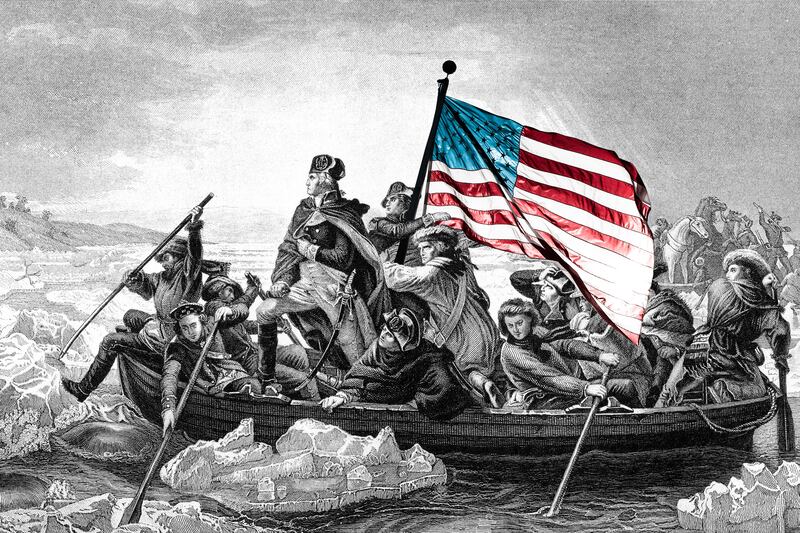In the preface to his 2004 biography “His Excellency, George Washington,” Joseph Ellis calls our first president the “great American patriarch” and notes that “for reasons best explained by Shakespeare and Freud, all children have considerable difficulty approaching their fathers with an open mind.”
Never has this observation been more relevant than today.
Increasingly, Washington and the founders in general are looked upon as little more than greedy white colonizers, many of whom showed odious hypocrisy by owning slaves. But in this characterization, we ignore a fundamental truth: Washington was and remains our national patriarch — we are his children, and we separate ourselves from him at our own peril. This is especially true in a time when our own families are increasingly bereft of fathers in the home.
According to census data, the number of American children living with only their mother has doubled in the past 50 years. In an era of widespread distrust and dismantling — of institutions, traditions, religious faith, and especially the nuclear family — we likewise find ourselves in a politically fatherless climate.
In a sense, fatherlessness has become a norm. And now some claim we must rid ourselves altogether of Washington and the founders in order to atone for sins of the past with the eyes of the present. But such a move toward voluntary fatherlessness will only increase polarization and invite civic destruction.
Of course the experiment that is America was always under threat of collapse whether it be from divisive political parties or bickering colony-states. As Dennis Rasmussen wrote in “Fears of a Setting Sun,’ Washington himself feared the fledgling republic would not survive, writing in his final years that the country was “moving by hasty strides to some awful crisis” and pleading for his fellow countrymen to embrace unity.
But the republic endured, in part, because our nation was gifted a father, one of the best the world has ever seen.
After winning the Revolutionary War, many feared (and some even expected) that a monarchy or dictatorship would emerge, with Washington at the helm. But America’s great patriarch resisted the pull of power and stepped down from his position as commander in chief. It was the sort of selfless act that good parenting requires.
Ellis writes of this moment that Washington “saw himself as a mere steward for a historical experiment … larger than any one person, larger than himself; an experiment which all leaders, no matter how indispensable, were disposable.” In a word, “His Excellency,” as the people affectionately called him, was a father: there when needed and gone when the time required.
At the drafting of the Constitution in 1787, the states involved in revising the Articles of Confederation disagreed bitterly about the laws and future structure of the newly formed United States of America. The tension was such that compromise seemed impossible between any of the states, were it not for Washington. Ellis writes that Washington’s importance in the Constitutional Convention “was a function of his presence, which lent an air of legitimacy to (the) proceedings.”
From the mere presence of the American patriarch came what is now known as the Great Compromise, which led to the Constitution we cherish and must continually seek to uphold.
When the time came to choose an executive leader for the country, the states again found themselves in disarray until the unifying father was called back into service. With 69 electors voting unanimously for Washington, he became our first president, the only one to have never campaigned. As Ellis notes, “He was not chosen for what he thought, but for who he was.”
Interestingly, Washington never sired children (though his wife, Martha, had two from a previous marriage). Emeritus professor Susan Dunn of Williams College notes that in a draft of his first inaugural address, Washington wrote, “I have no child, no family to build in greatness upon my country’s ruins.”
But the truth came at his funeral when a speaker declared, “Americans! He had no child — but you.”
Washington’s influence at the Constitutional Convention and his character as president resembled that of a father who takes responsibility for his family, watches over them and protects them. Of course, he wasn’t perfect — no one is — but he was there when he was needed, even while pining for his home at Mount Vernon. He never left us fatherless. And because of him we now have the privileges, freedoms and blessings afforded to few others in the history of the world.
There is no revolutionary win without Washington, no successful drafting of the constitution, no successful birthing of the nation. These things were impossible without our founding father and much is impossible still should we choose to reject him. For to abandon one’s father is to receive no inheritance. And our inheritance is America itself.
Scott Raines is a writer and doctoral student at the University of Kansas.


